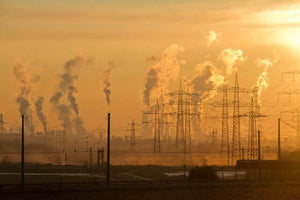The World Health Organization (WHO) says that almost the entire population of the world breathes air that contains high levels of pollutants, exceeding their guidelines.

This affects people in some parts of Australia.
In this post, we’re going to take a look at the facts about air pollution in Australia and what you can do to keep healthy and protect yourself.
Air pollution: the global picture
Data collected by the WHO says that 99% of the world’s population is breathing in air that exceeds their guidelines.
This heavily polluted air is linked to seven million premature deaths every year.
Low- and middle-income countries are the most badly affected, but air pollution affects wealthier countries like Australia too.
Air pollution may be caused by gases like carbon monoxide and sulphur dioxide or particulates — tiny solid or liquid particles that are suspended in the air.
These particulates can originate from burning fossil fuels or exhaust fumes from vehicles.
Small particulate matter, referred to as PM2.5, can pose a threat to our health, as these tiny particles can get into the lungs, bloodstream and organs.
Being exposed to this pollution over time links to serious diseases such as cancer, heart disease, stroke and chronic obstructive pulmonary disease (COPD).
And in the short term, pollution can worsen the symptoms of chronic diseases such as asthma.
Air pollution in Australia
While there is no safe level of air pollution, experts have put together guidelines to define acceptable limits.
The WHO guidelines say PM2.5 air pollution should be less than 15 micrograms per cubic metre of air (15 μg/m³) daily.
The Australian standards say this figure should be 25 µg/m³ averaged over a 24-hour period.

The good news is that PM2.5 levels in Australia are currently meeting the WHO guidelines — at the time of writing this article, the PM2.5 concentration in Australia was only 1 µg/m³.
However, it’s worth knowing that we can experience some short-term and extremely high levels of pollution. For example, air pollution in Australia during bushfires can meet excessive levels.
In the summer of 2019-20, PM2.5 levels were more than 200 µg/m³ on five days due to bushfire smoke.
Other extreme events, such as dust storms, can also affect air quality.
Air pollution also varies according to where you live in Australia. In 2019, 13 of the 15 most polluted cities in Australia were located in New South Wales, with Armidale (also in New South Wales) taking the top spot as the number one polluted city.
By contrast, in the same year, 23 out of the 24 least polluted cities were found in Tasmania, with the cleanest place being St. Helens.
What causes air pollution in Australia?
Air pollution in Australia can be caused by:
- Vehicle emissions
- Industry
- Power stations
- Domestic wood heaters
- Bushfires in the summer months
- Dust storms, which are most common in spring
How can I protect myself and my family from air pollution?
If you live in a more heavily polluted area or your locality is experiencing extreme conditions like a dust storm or bushfire, here’s what you can do to protect yourself and your family:
- Be aware of air pollution levels in your area. You can check these on your local weather forecast.
- Limit your time outdoors when pollution levels are high and avoid exercising outside — do a workout at home instead.
- Don’t exercise outside in areas of heavy traffic flow — even when air pollution levels are good.
- Use less energy at home, and in particular, limit your use of wood-burning heaters.
- Don’t allow your vehicle to idle while you are parked — turn the engine off.
- Switch to an electric or hand-powered lawnmower and other garden equipment.
- Don’t smoke indoors.
- Use face masks if you need to visit a heavily polluted area or in extreme events like bushfires or dust storms — an N95 face mask will give you the best protection from harmful particles. Surgical-type masks make effective filters for less extreme pollution.
Keep vigilant and keep safe
Thankfully, Australia has some of the cleanest air in the world, so you shouldn’t be too worried about air pollution on a day-to-day basis.
However, there are times when you need to be vigilant about air quality, for example, during bushfires or other unusual events.
To keep safe, make sure you follow our common sense guidelines, such as wearing a face mask if you need to travel to a heavily polluted area or are experiencing an unusual occurrence like a bushfire.
You can check out our range of face masks and other health and well-being products in our online shop — they’re all designed to keep you and your loved ones safe in every scenario!

